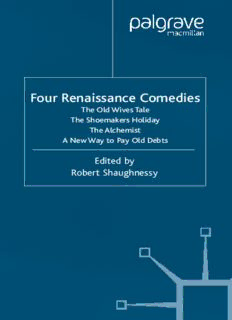
Four Renaissance Comedies PDF
Preview Four Renaissance Comedies
Four Renaissance Comedies The Old Wives Tale The Shoemakers Holiday The Alchemist A New Way to Pay Old Debts Edited by Robert Shaughnessy FOUR RENAISSANCE COMEDIES Also published by Palgrave Macmillan: Colin Gibson (ed.), Six Renaissance Tragedies David Thomas (ed.), Six Restoration and French Neoclassic Plays David Thomas (ed.), Four Georgian and Pre-Revolutionary Plays Four Renaissance Comedies The Old Wives Tale The Shoemakers Holiday The Alchemist A New Way to Pay Old Debts Edited by ROBERT SHAUGHNESSY Introduction,selection and editorial matter © Robert Shaughnessy 2004 All rights reserved.No reproduction,copy or transmission of this publication may be made without written permission. No paragraph of this publication may be reproduced,copied or transmitted save with written permission or in accordance with the provisions of the Copyright,Designs and Patents Act 1988,or under the terms of any licence permitting limited copying issued by the Copyright Licensing Agency,90 Tottenham Court Road,London W1T 4LP. Any person who does any unauthorised act in relation to this publication may be liable to criminal prosecution and civil claims for damages. The author has asserted his right to be identified as the author of this work in accordance with the Copyright, Designs and Patents Act 1988. First published 2004 by PALGRAVE MACMILLAN Houndmills,Basingstoke,Hampshire RG21 6XS and 175 Fifth Avenue,New York,N.Y.10010 Companies and representatives throughout the world PALGRAVE MACMILLAN is the global academic imprint of the Palgrave Macmillan division of St.Martin’s Press,LLC and of Palgrave Macmillan Ltd. Macmillan® is a registered trademark in the United States,United Kingdom and other countries.Palgrave is a registered trademark in the European Union and other countries. ISBN 0–333–97365–8 hardback ISBN 0–333–97366–6 paperback This book is printed on paper suitable for recycling and made from fully managed and sustained forest sources. A catalogue record for this book is available from the British Library. Library of Congress Cataloging-in-Publication Data Four Renaissance comedies / edited by Robert Shaughnessy. p.cm. Includes bibliographical references and index. Contents:The old wives tale / George Peele—The shoemakers’ holiday / Thomas Dekker—The alchemist / Ben Jonson—A new way to pay old debts / Philip Massinger. ISBN 0–333–97365–8—ISBN 0–333–97366–6 (pbk.) 1.English drama (Comedy) 2.English drama—Early modern and Elizabethan,1500–1600.3.English drama—17th century.I.Shaughnessy, Robert,1962– PR1248.F68 2003 822’.05230803—dc22 2003053655 10 9 8 7 6 5 4 3 2 1 13 12 11 10 09 08 07 06 05 04 Printed and bound in China For Jacqueline Contents Acknowledgements viii General Introduction ix ANote on the Texts xxvii The Old Wives Tale 1 Introductory Note 1 Text 6 Notes to the Play 29 The Shoemakers Holiday 33 Introductory Note 33 Text 41 Notes to the Play 95 The Alchemist 105 Introductory Note 105 Text 113 Notes to the Play 213 ANew Way to Pay Old Debts 231 Introductory Note 231 Text 238 Notes to the Play 308 Further Reading 313 vii Acknowledgements Thanks are due to all those at Palgrave Macmillan who have supported this edition, especially Sonya Barker, Felicity Noble, Beverley Tarquini and Anna Sandeman; to the anonymous readers who offered constructive criticism and saved me from a number of egregious errors; to my students at the University of Surrey Roehampton, whose enthusiastic engagement with the plays has confirmed for me their enduring comic life; and to my family, for offering the space in which I could make it happen. viii General Introduction For many contemporary readers, theatre practitioners and theatregoers, there is one basic problem with the plays that are found under the generic umbrella of comedy during the late sixteenth and early seventeenth centuries: they are not, on the face of it, very funny. Indeed, at the turn of the twenty-first cen- tury, when the global template of comedy is defined by the uniquely brilliant combination of domestic soap opera, everyday surrealism, sly media references and social satire of The Simpsons, the sense of humour that informs the comic drama of the English Renaissance can often seem misguided, objectionable or incom- prehensible, and the plays themselves contrived and artificial. The theatre director Sam Mendes recalled a particularly dispirit- ing experience of this kind during the first reading of The Alchemist for the RSC in 1991: ‘the first day in rehearsal, it was like the actors were reading a sort of Swahili text. I’ve never had such a terrible run-through in my life, and such an appallingly depressed group of actors’.1 Jonson, like most if not all of his contemporaries (other than Shakespeare for some; including Shakespeare for others), is perceived as opaque, deadly and alien; and no doubt a major component of the actors’ despon- dency was the dread that they were not only going to have to make the text work, but, even more terrifyingly, actually provoke audiences to laughter. Mendes and his team quickly realised that the most effective route into the play was to abandon preconcep- tions about motivation and character psychology and to focus instead upon the rhythm and shape of the action, which meant ‘doing a very early run-through just to see what doors people had to come in and out of’; ‘we had to sort of decode it as a series of moves, a series of journeys, a series of stage shapes’.2It seems a sensible way of approaching not only Jonsonian comedy but comic drama in general (and one not without precedent in ix
Description: